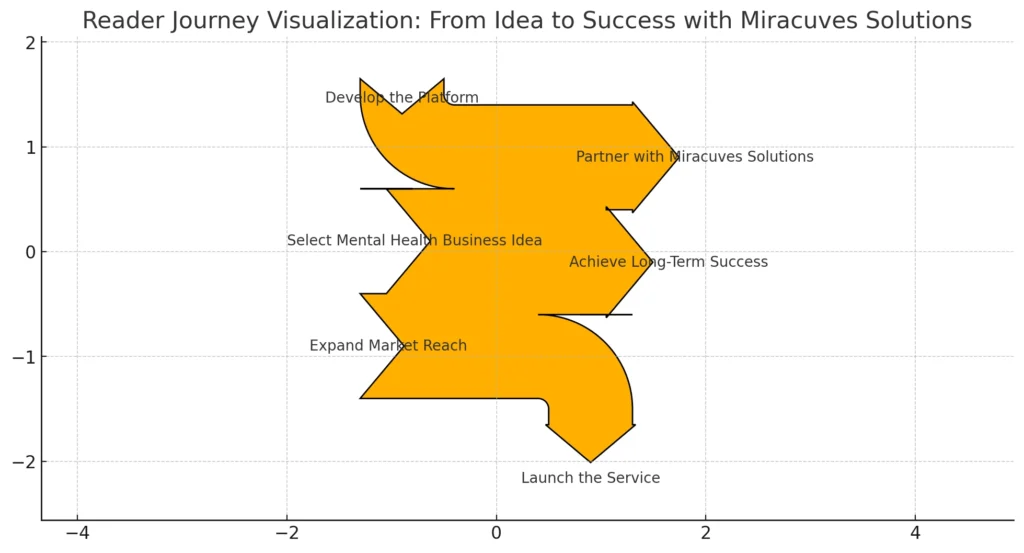Mental health and counseling services are becoming more important than ever. As society becomes more aware of the need for emotional well-being, the demand for accessible mental health support continues to grow. From anxiety management to stress reduction and therapy services, people are increasingly seeking professional guidance to maintain their mental well-being.
The COVID-19 pandemic further highlighted the significance of mental health, leading to the rise of online counseling platforms, self-care apps, and corporate wellness programs. Today, starting a mental health or counseling business is not only a profitable idea but also a meaningful one, offering entrepreneurs the opportunity to make a positive impact.
Advancements in technology, such as AI-powered chatbots, teletherapy tools, and meditation apps, have created new ways to deliver mental health services efficiently. As a result, mental health startups can now reach clients around the world, making it easier to offer support whenever and wherever it’s needed. In this article, we explore the top 10 ideas for mental health and counseling startups to help you find the perfect fit for your entrepreneurial journey.
Why Choose Mental Health and Counseling Business?
The mental health industry offers a unique opportunity to combine profitability with meaningful impact. With mental health awareness growing, more people are actively seeking support to manage stress, anxiety, and other emotional challenges. This has opened the door for innovative startups to address these needs by offering accessible, user-friendly services.
One of the key reasons to enter this space is the increasing acceptance of online therapy and self-help platforms, which allow individuals to seek help from the comfort of their homes. Traditional barriers, such as the stigma surrounding therapy, are slowly fading, making mental health services more mainstream.
Another compelling reason is the rise of corporate wellness programs. Companies now understand the importance of emotional well-being and are investing in mental health support for employees. Startups that offer counseling services tailored to workplace environments have significant potential to tap into this growing market.
Technology plays a crucial role in making these services scalable. AI-powered tools and apps offer mental health support in real-time, helping users manage their emotions through chatbots and virtual counseling sessions. By integrating these technologies, startups can reduce costs while reaching more people in need of help.
This combination of growing demand, corporate investment, and digital tools makes the mental health and counseling business both a socially impactful and profitable venture for aspiring entrepreneurs.

Current Trends and Future Opportunities in Mental Health Services
The mental health industry is evolving rapidly, with new trends and technologies transforming how services are delivered. One of the biggest shifts is the rise of online therapy platforms. Virtual counseling has become a preferred choice for many, offering convenience and privacy for individuals seeking mental health support. Teletherapy services allow counselors to connect with clients across regions, breaking geographical barriers and expanding access.
Another significant trend is the development of mental wellness apps. These apps provide users with tools for meditation, mood tracking, and stress management, empowering people to take control of their mental well-being. Businesses focused on developing user-friendly apps with interactive features, like guided meditation and journaling, are gaining popularity.
The growing emphasis on corporate wellness programs also presents exciting opportunities. Companies are increasingly investing in mental health initiatives to support employee well-being. Startups that offer tailored counseling and stress management services to organizations are finding success in this space.
AI-powered mental health tools are another trend to watch. From chatbots that provide emotional support to platforms offering real-time insights based on user behavior, AI is reshaping mental health services by making them more accessible and responsive. These technologies also enhance scalability, allowing startups to serve more clients efficiently.
The future of mental health services lies in integrated care models that combine traditional therapy with digital tools. Entrepreneurs who embrace these trends can unlock new opportunities, helping people maintain mental well-being through innovative solutions.
The rise of AI-powered tools is transforming the mental health industry by providing automated emotional support and personalized mental health advice. Platforms like Woebot utilize AI to offer users instant access to mental health resources, helping them manage stress and anxiety in real-time. Startups leveraging these AI-powered tools can enhance their service offerings, making mental health support more accessible and efficient for their clients.
| Trend / Technology | Impact on Services | Opportunities for Startups |
|---|---|---|
| Online Therapy Platforms | Expands access across regions | Build teletherapy services for global clients |
| Mental Wellness Apps | Empowers users with self-help tools | Develop meditation and mood-tracking apps |
| Corporate Wellness Programs | Supports employee well-being | Offer stress management services to businesses |
| AI-Powered Mental Health Tools | Provides scalable emotional support | Create chatbots and real-time monitoring platforms |
Top 10 Ideas for Mental Health and Counseling Business Startups
| Business Idea | Startup Cost Range | Target Market | Profit Potential |
|---|---|---|---|
| Online Therapy Platform | Medium | Individuals seeking remote therapy | High |
| Corporate Wellness Programs | Medium | Companies and remote workers | Very High |
| AI-Powered Mental Health Chatbot | High | People needing emotional support | High |
| Mood Tracking App | Low to Medium | Individuals managing mental well-being | Moderate |
| Mental Health Retreats and Workshops | High | Wellness seekers | High |
| Specialized Therapy for Children | Medium | Schools and parents | Moderate to High |
| Self-Help Mental Wellness App | Low to Medium | Individuals seeking personal tools | Moderate |
| Counseling for Marginalized Communities | Medium | Underserved communities | High (with funding support) |
| Mental Health Coaching Service | Low | Personal growth seekers | Moderate |
| Virtual Support Groups and Forums | Low | Peer support communities | Moderate |
1. Online Therapy Platform
Develop a platform offering virtual therapy sessions, connecting licensed therapists with clients for convenient, remote mental health support.
- Target Market: Individuals seeking affordable, private therapy
- Estimated Costs: Medium (Platform development, therapist network)
2. Corporate Wellness Program Service
Offer customized mental health programs to companies, helping employees manage stress and improve well-being through workshops, counseling, and wellness activities.
- Target Market: Corporate businesses and remote workers
- Estimated Costs: Medium (Program design, therapist team)
3. AI-Powered Mental Health Chatbot
Create an AI chatbot providing 24/7 emotional support and mental health advice. These bots can handle non-crisis situations and recommend further counseling if needed.
- Target Market: People needing instant mental health support
- Estimated Costs: High (AI development, chatbot integration)
4. Mood Tracking App
Design a mobile app that helps users track their moods and emotions over time, providing insights into their mental state and suggesting self-care routines.
- Target Market: Individuals managing mental well-being
- Estimated Costs: Low to Medium (App development, analytics)
5. Mental Health Retreats and Workshops
Host wellness retreats focused on mental health, mindfulness, and personal growth, offering group therapy sessions and self-care activities.
- Target Market: People seeking immersive wellness experiences
- Estimated Costs: High (Event planning, facility rental)
6. Specialized Therapy Service for Children and Teens
Provide counseling services tailored to children and adolescents, addressing issues like anxiety, bullying, and academic pressure through engaging therapy.
- Target Market: Parents, schools, and young individuals
- Estimated Costs: Medium (Licensed therapists, marketing)
7. Self-Help Mental Wellness App
Develop an app that offers guided meditations, stress-relief exercises, and self-care reminders to support users in improving their emotional well-being.
- Target Market: Individuals looking for personal mental health tools
- Estimated Costs: Low to Medium (App features, content creation)
8. Counseling Services for Marginalized Communities
Launch a platform offering affordable or free counseling services for underserved communities, focusing on inclusion and accessibility.
- Target Market: Marginalized and underserved communities
- Estimated Costs: Medium (Platform development, partnerships)
9. Mental Health Coaching Service
Provide one-on-one coaching sessions to help individuals set personal goals and build emotional resilience through practical strategies.
- Target Market: Individuals seeking personal growth and emotional development
- Estimated Costs: Low (Coaching certifications, online tools)
10. Virtual Support Groups and Forums
Create online spaces where individuals can join moderated support groups and forums to connect with others facing similar mental health challenges.
- Target Market: People looking for community and peer support
- Estimated Costs: Low (Platform setup, community management)
Offering virtual therapy sessions is one of the top ideas for mental health startups. Platforms like BetterHelp have revolutionized the way therapy is delivered by allowing clients to connect with licensed therapists from the comfort of their homes. Virtual therapy provides flexibility and convenience, making mental health services more accessible to a broader audience. Startups that develop robust virtual therapy solutions can meet the increasing demand for remote mental health support while providing high-quality care.
Read more : – How to Build a Virtual Healthcare App Like Zocdoc for Medical Scheduling
Real-World Examples
Several mental health startups have already made a significant impact, showing how innovation and empathy can transform the industry. A great example is online therapy platforms that connect licensed therapists with clients worldwide. These platforms have removed the geographical barriers to counseling, making mental health services more accessible and affordable for everyone.
AI-powered chatbots are another success story, offering 24/7 emotional support for users dealing with stress and anxiety. These bots not only provide instant responses but also help individuals manage their emotions in real time. Startups leveraging AI technology have gained a competitive edge by ensuring users always have access to mental health resources when they need them the most.
Corporate wellness programs are thriving as businesses realize the importance of supporting employee well-being. Startups offering tailored programs, including stress management workshops and counseling services, have successfully partnered with companies to enhance workplace productivity and morale.
The rise of self-help apps is also notable, empowering users to improve their mental well-being independently. These apps offer features like guided meditation, mood tracking, and personalized wellness plans. With a growing user base, these startups show how technology and mental health can seamlessly come together to make a difference in people’s lives.
| Business Model | Success Rate (%) | Common Challenges |
|---|---|---|
| Online Therapy Platforms | 85% | Managing therapist availability |
| AI-Powered Chatbots | 80% | Balancing automation with empathy |
| Corporate Wellness Programs | 78% | Engaging employees in wellness activities |
| Self-Help Apps | 75% | Retaining user engagement |
Mistakes to Avoid When Starting a Mental Health Business
Starting a mental health business can be both rewarding and challenging. However, there are common mistakes that many new entrepreneurs make, which can slow down progress or even derail a great idea. Being aware of these pitfalls will help you build a sustainable business while staying ahead of the competition.
1. Overlooking Legal and Ethical Standards
Mental health services require strict adherence to legal and ethical guidelines. Neglecting these can lead to fines, shutdowns, or loss of trust. Ensure that your business follows confidentiality laws, obtains necessary licenses, and upholds high ethical standards in every interaction.
2. Not Defining a Niche Market
Trying to serve everyone is a common mistake. Mental health needs vary widely—some clients need anxiety support, while others may require trauma counseling. Focusing on a specific niche, such as corporate wellness or teen counseling, helps you stand out and attract the right audience.
3. Poor Technology Integration
In today’s digital landscape, technology plays a vital role in delivering mental health services. Startups that avoid investing in essential tools, such as appointment scheduling software or secure teletherapy platforms, risk falling behind competitors. Use technology to streamline your operations and enhance user experience.
4. Underestimating Marketing Efforts
Many startups rely only on word-of-mouth marketing, which limits growth. Building a strong online presence through social media and targeted advertising is essential to reach a larger audience. Effective marketing helps your business grow sustainably by attracting more clients.
5. Inconsistent Customer Experience
Mental health services require trust and consistency. Offering inconsistent services or having unresponsive customer support can damage your reputation. Develop a system to provide reliable services, engage with clients regularly, and follow up on their progress.
| Common Mistake | Impact on Business | Preventive Strategy |
|---|---|---|
| Overlooking Legal and Ethical Standards | Fines and loss of trust | Adhere to regulations and ethics |
| Not Defining a Niche Market | Difficulty attracting the right clients | Focus on a specific audience |
| Poor Technology Integration | Inefficient service delivery | Use essential tools for scheduling and teletherapy |
| Underestimating Marketing Efforts | Limited customer reach | Invest in social media and targeted ads |
| Inconsistent Customer Experience | Loss of clients and reputation | Provide reliable services with regular follow-ups |
Why Trust Miracuves Solutions for Your Next Project?
When it comes to launching a successful mental health business, having the right technology partner is essential. Miracuves Solutions offers everything you need to build powerful, user-friendly platforms that meet the unique demands of the mental health industry. With a focus on speed, efficiency, and affordability, Miracuves ensures your business is ready to make a difference from day one.
1. Expertise in Mental Health Platforms
Miracuves Solutions specializes in developing mental health platforms, including teletherapy systems, mental wellness apps, and AI-powered chatbots. With their deep understanding of industry needs, they design solutions that provide a seamless experience for both users and practitioners.
2. Faster Time to Market
Launching your platform quickly can give you a competitive edge. Miracuves Solutions completes projects 30 times faster than the industry average, allowing you to get your services up and running without delays. Whether you need a scheduling system or an all-in-one therapy app, they ensure rapid delivery with precision.
3. Affordable Development Services
Miracuves Solutions offers cost-effective solutions, providing high-quality platforms at just 10% of the global average cost. This allows startups to invest more in growing their business without compromising on technology or performance.
4. Scalable and Future-Ready Solutions
Your mental health business needs to grow along with demand, and Miracuves Solutions offers scalable platforms that evolve with your business. As your client base expands, their systems adapt, ensuring you’re always equipped to meet new challenges without disruptions.
5. Continuous Support and Maintenance
Miracuves Solutions doesn’t just stop at launch. Their team provides ongoing support to keep your platform updated and running smoothly, ensuring you stay ahead of the competition with the latest features and tools.

Conclusion
The mental health and counseling industry offers incredible opportunities for entrepreneurs who are ready to make a positive impact on people’s lives. With rising awareness and a growing focus on emotional well-being, the need for accessible and innovative mental health solutions has never been greater. Whether through online therapy platforms, AI-powered chatbots, corporate wellness programs, or mood-tracking apps, the possibilities are vast.
Success in this field requires balancing empathy with technology, ensuring that clients receive personalized care while benefiting from advanced tools. Entrepreneurs who stay ahead of industry trends, embrace technology, and offer specialized services can build meaningful businesses that thrive in the long run.
This is the perfect time to transform ideas into action. With the right strategies and a clear understanding of market needs, your mental health business can grow into a valuable service that touches countless lives.
FAQs
How much does it cost to start a mental health business?
The startup cost depends on the model. A simple online counseling service may require moderate investment, covering platform setup and marketing, while AI-powered apps or wellness programs can involve higher development costs.
What technologies are essential for a mental health business?
Teletherapy platforms, secure scheduling systems, AI chatbots, and mood-tracking apps are key technologies that enhance service delivery and improve client experiences.
How can I attract clients to my mental health business?
Building an online presence through social media and targeted marketing is essential. Offering free resources, webinars, and client success stories can also establish trust and attract new clients.
What challenges do mental health startups face?
Common challenges include maintaining client confidentiality, managing client retention, and staying updated with the latest technology. Addressing these challenges proactively ensures smoother operations.
How can I scale my mental health business over time?
Start by focusing on a niche market, then expand services based on client needs. Introducing subscription models, corporate partnerships, and new technologies will help you grow sustainably.
Related Articles:
- How to Develop a 1mg Alternative App in 2025
- How Much Does It Cost to Build an Online Pharmacy App from Scratch?
- How to Develop a Netmeds Alternative App in 2025
- How to Build an App Like Alibaba: Full-Stack Developer Guide
- How to Develop a Rover Alternative: Smart Way to Tap Into the Pet Services Boom








